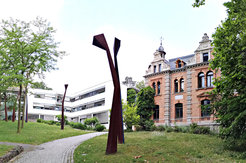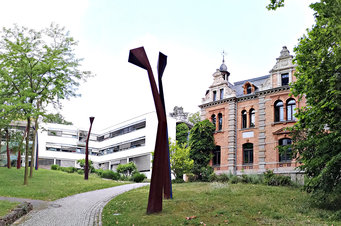Renaming of the Max Planck Institute for the Science of Human History
New research focus in the field of geoanthropology
The Max Planck Society’s Senate, in its most recent meeting, decided to rename the Max Planck Institute for the Science of Human History in Jena the "Max Planck Institute of Geoanthropology" to reflect the Institute’s scientific reorientation. The scientific concept for geoanthropology, which was approved by all three Sections of the Max Planck Society in their meetings in October 2020, was largely developed by Prof. Jürgen Renn, Director at the Max Planck Institute for the History of Science in Berlin. To advance the concept’s implementation, Prof. Renn was appointed as Director at the Institute.

In future, the institute will research the interrelationships between the geosphere and human-made systems. It is designed to be cross-sectional and will bring together research areas that are represented in all three scientific Sections of the MPG. Corresponding inter- and transdisciplinary research projects concern, for example, planetary urbanisation, the global food system and global material, energy and information flows. "The Institute will track human-ecosystem dynamics and bring together, model and interpret data and expertise from different sub-disciplines such as climate research, biodiversity research and social sciences. The key questions range from the deep past to the distant future and include the question of how humanity has driven the emergence of the Anthropocene and can still positively influence its course," explains Jürgen Renn.
"The concept is an excellent fit for the Jena location," emphasizes Vice President Ulman Lindenberger. "On the one hand, there are numerous links to the research work of the two MPIs for Biogeochemistry and for Chemical Ecology at the Beutenberg Campus. On the other hand, the existing groups at the Institute with an archaeological focus perfectly complement the newly appointed research groups and departments”.
Current plans for the realigned Institute envisage five departments and up to three research groups. Since mainly model-based and interpretative approaches are to be pursued, the Institute is predominantly theoretically oriented. The experimental groups will initially be staffed by the archaeological working groups of the predecessor institute; in addition, one of the five departments will also be able to work experimentally. The state of Thuringia will support the conversion with funding.
An initial concept for a Max Planck Institute of Geoanthropology was developed as early as 2018. In order to explore its scientific viability and the possibilities for attracting excellent scientists, an intersectional core committee consisting of members from all three Sections of the Max Planck Society was established in 2019. A Presidential Commission was involved in the search for a location.
